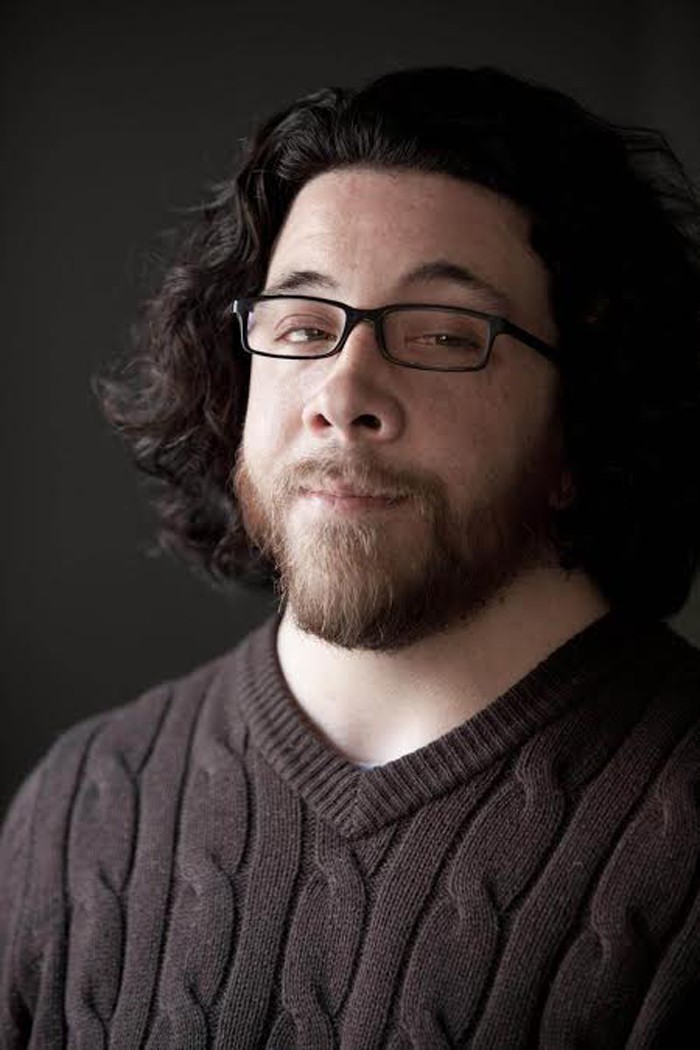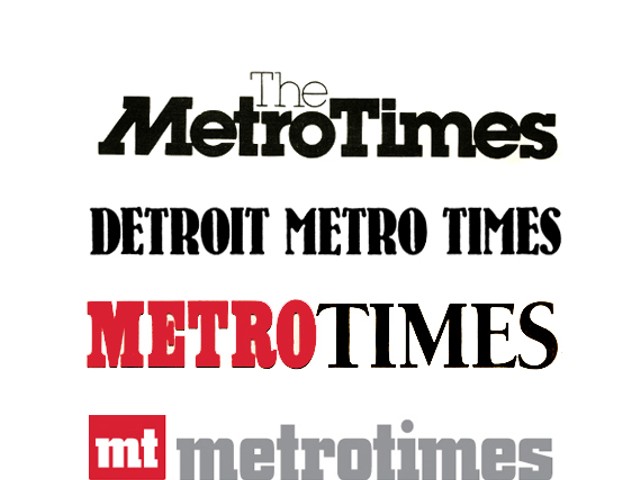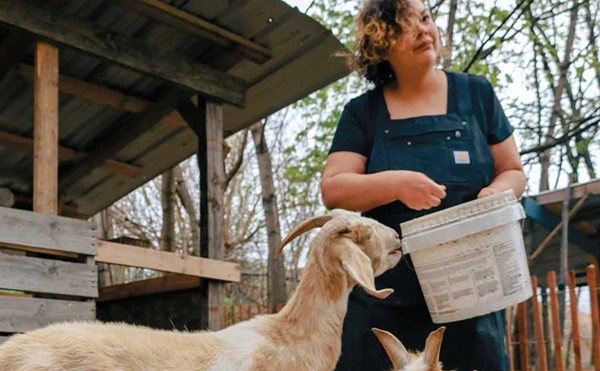Saladin Ahmed is the Arab-American author of the fantasy novel Throne of the Crescent Moon. He’s been nominated for the Hugo, Nebula, Crawford, and Gemmell awards, he won the Locus Award for Best First Novel, and he receives rave reviews around the world, in multiple languages.
Ahmed was born and raised in metro Detroit, and currently lives in a suburb just north of the city. He contributes nonfiction to Salon, NPR, and BuzzFeed. Ahmed is popular and outspoken on social media, where he examines race and gender in mainstream media, and takes a closer look at the history of comic books. His second novel, The Thousand and One, will be released in February 2015.
Metro Times: Tell us about your heritage and what it was like growing up in Detroit.
Saladin Ahmed: I grew up in Dearborn, in the south end and east side of Dearborn, in majority Arab-American, working-class communities. My father was a well-known figure in the Arab-American community, Ismael Ahmed, who founded ACCESS and Concert of Colors. I can remember the first few concerts, and I have memories of him in the van driving artists around. He’s got a show on WDET now. But his legacy is that he co-founded and ran ACCESS, Arab Community Center for Economic and Social Services, a hub in Dearborn for the Arab community. He was very involved in Detroit arts, so even as a kid I was going to poetry readings and hearing music and stuff like that.
MT: Why did you leave Detroit, and why did you come back to the area?
Ahmed: I left for graduate school. So I went to Henry Ford Community College, finished up at U-M, and I had friends who lived in NYC, and wanted to go to grad school for an MFA in poetry, so I moved there. I didn’t think I’d be there very long, but I ended up being there for 11 years.
The reason I moved back was for cost of living. It’s been made an unlivable city for people with families who aren’t extremely well-off. My wife got pregnant with twins. We were in a one-bedroom apartment. I have family here, and my wife got a great job offer here. We ended up moving to the northern burbs, and we’ve been here for about three years, a little more than that. My folks have moved further out in the burbs. My extended family is still in Dearborn.
MT: So how did you go from poetry to sci-fi?
Ahmed: After finishing the MFA, I thought I was going for a doctorate. I wasn’t writing much poetry; the Ph.D. was such a grind and not inspiring. I ran into a friend who wrote these very weird plays, and she asked me if I was still writing the weird poems, and I said, “No, I’m just doing course work.” I asked her if she was still writing the really weird plays, and she said, “No, I’ve always wanted to write a romance novel, so that’s what I’m working on.”
I always wanted to write fantasy. It was in my heart. I wasn’t writing poems, so I said, “I’m gonna try this.” I went to some workshops. There are sci-fi/fantasy readings a couple times a month with writers and editors going to them [in New York], so I met people on the scene. That’s a nice thing about New York. I wrote a few short stories before I finished the novel. And I was lucky those short stories got attention. Writers like to talk about how many times they got rejected before they got published. It was a pretty straightforward process for me, so it went as smoothly as I could have hoped for. A vast majority of that had to do with luck.
Now, I’m raising two small children. That takes up the vast majority of my time and mental energy. Then the same thing that eats up everyone’s time, like eating ice cream.
MT: Sci-fi/fantasy seems to be dominated by white men. What are some of the challenges you’ve faced?
Ahmed: There are very few Muslim-American, Arab-American science fiction writers. But there have always been; when you dig, you find a lot of stories have been forgotten or erased. There are a number of African-American and Asian-American writers, especially in the short fiction markets. There are tons of online resources on this. There’s a lot of good stuff out there and good people doing it.
Is there a problem with racism and diversity in sci-fi/fantasy? Yeah, there is. A big one. What’d I’d say is, it’s more of a problem in American culture, the stories we tell about each other, and economically. It’s who owns the means of production, to be old-school Marxist about it. Certain industries are dominated by white people and white men. Economically there is still a tremendous imbalance. If you look at the board of directors of any publishing company, you’ll see mostly white men, one woman, and one person of color.
So if there is a lack of diversity, it’s reflective of a bigger problem. I will say I’ve gotten the random dismissal — I’ve literally been accused of being a terrorist fantasy writer. If you have a guy in a turban with a sword on the cover, some people will be scared away and made angry.
MT: And yet so much fantasy has scantily clad women on the cover. Does that ever scare anyone away?
Ahmed: Ha! Not these guys. But the vast majority of the people in the field have made me feel welcome.
MT: You have an amazing Twitter feed, and you do a lot of commentary on people of color and women, as they are portrayed in early American comics and today’s mainstream media. Why do you comment? And what are your observations?
Ahmed: It’s got so much to do with the way I experience the world. It’s a big part of my experience, and a big part of a lot of people’s experience. It would feel false not to comment.
Lately I’ve been looking at a lot of older stuff, and you realize that things sort of ebb and flow, and you stop trusting the straight line, that things just are kind of racist or sexist, because that’s how they’ve always been. One of my recent projects is researching super-heroines of the 1940s, and when you see how independent and violent and hyper competent these characters are, the idea that it was like an episode of Mad Men — that’s not true, and maybe we shouldn’t trust this idea of a straight line, that we’re getting better and better.
MT: Why do you think that is?
Ahmed: Again, the economics of this. Women had disposable income. They were working. Kids were working. These people had money to buy comic books. If you look at the ads, many are aimed at women. You could look at a gruesome comic book, and it has ads for dresses.
There are a lot of ways that women in the ’40s had more independence than the women in the 1950s, when the men came back from the war — but men were still writing them. And, there’s a sense that that’s not who you’re selling comics for anymore.
MT: What’s next for you?
Ahmed: There’s a few different things, besides book two, there’s an online storytelling game called Storium, and they have a Kickstarter that funded fully in 24 hours, and now it’s surpassed $100,000. It’s an online interactive storytelling game. They commissioned me for A Thousand Nights and a Night game world.
MT: Is it like a choose-your-own-adventure?
Ahmed: It’s writing as playing. So people are actually writing the prose for their characters. There are these online storytelling cards, written by those of us designing the game world. It’s really interesting; the speed with which it was funded was crazy.
Check out Storium at storium.com. Follow Ahmed on Twitter @saladinahmed and see his website at saladinahmed.com.






